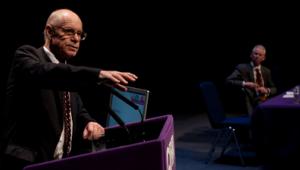New politics is rarely what it proclaims – and, if history is anything to go by, reality soon gets in the way of rhetoric
Every new government thinks it’s different, but mostly they act the same. They come in bright-eyed and bushy-tailed, proclaiming ‘change’ and ‘new politics’, but they soon run up against exactly the same problems: deficits, bankers, the press and, of course, stroppy unions who don’t see why they should do as they’re told.
Take the present lot, who arrived with the usual rosy glow of confidence – the Cameron and Clegg love-in behind Downing Street would have been illegal in 45 American states – certain they wouldn’t repeat the errors of the idiots from whom they took over. Then it all turned sour.
Take what’s now called the ‘J-turn’ over NHS reforms. Faced with the most powerful and intractable union of the lot – no, not Bob Crow’s RMT, but the British Medical Association – Cameron caved in, leaving poor Health Secretary Andrew Lansley twisting slowly in the breeze, like the victim of a lynching where the mob couldn’t bring themselves to finish the job.
Confronting a past set of doctors after the war, Nye Bevan announced that a national health service was part of Labour’s manifesto and that he was going to go ahead, however much they moaned. But Lansley’s plans weren’t in anyone’s programme before the election – and, in any case, were loathed by the LibDems. They may have less than one-fifth the number of seats won by the Tories in this coalition, but if they were to vote against anything, the measure would be lost.
After the health debacle, the prime minister then had the brass neck to declare the whole fiasco a huge success – proof that the government listened to the public and the practitioners. I was reminded of the Grand Old Duke of York marching his men down the hill and announcing that he had shown great strength of purpose by being prepared to change his mind.
Sometimes governments simply run into financial problems that won’t go away. Take the Tory promise to end fortnightly bin collections. Can’t be done, and the whiff of a 13-day-old tikka masala could be a nasty reminder of a broken pledge.
Or the government can run into trouble from the papers and their own headbangers. Take Ken Clarke’s wheeze to halve jail sentences for people who plead guilty. Helping to empty Britain’s overcrowded prisons could have saved millions – maybe billions. But given the combined opposition of the Tory right and the papers (it was the Sun that terrified New Labour; now the role seems to have been taken over by the Mail), Cameron quickly backed down. As he did on plans to ‘sell off’ forest land.
In Downing Street now, there are two former prime ministers who are seen as both paragons and awful warnings. Margaret Thatcher, still the Conservative’s saint, drove through reform in spite of opposition. But she was prepared to change her mind – viz the first, successful, miners’ strike – and it was only when she came to believe her own publicity and thought she could force through the poll tax that she came unstuck.
Tony Blair, whose book A Journey is certainly better-thumbed at Number 10 than, say, the Tory manifesto, makes it clear that he felt he should have tackled public service reform earlier. But, having ‘the scars on my back to prove it,’ as he said, he bottled out too. The new lot admire him for winning three elections on the trot. But they are determined to avoid his mistakes.
Right now, the struggle in Downing Street continues, between the modernisers and the cautious ones, such as George Osborne, who don’t want to risk anything that might cost money. Who will win? Chancellors usually do, but if they don’t and feel forced to resign – like Nigel Lawson – we know the end is nigh.
Meanwhile, Labour is making an attractive, if somewhat ingenuous, call for fewer cuts. If we are going to print money, it might as well go on public service jobs that also save on benefits and prime the economy. If shadow chancellor Ed Balls makes his case strongly enough, will the predicted tax cuts of 2014 do enough to save the coalition?
Simon Hoggart is the Guardian’s political sketchwriter. He delivered the fringe lecture at the CIPFA conference on July 5










